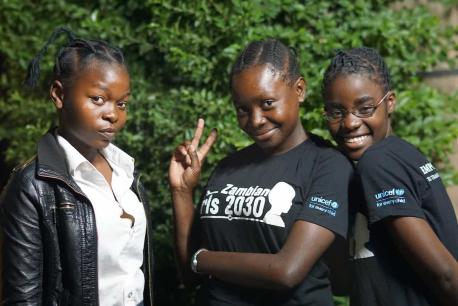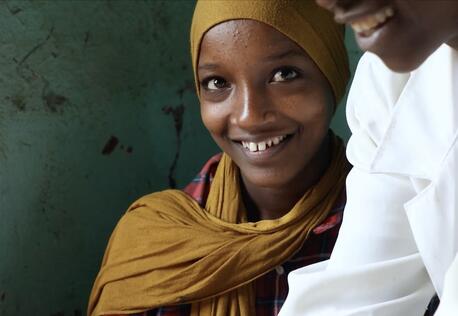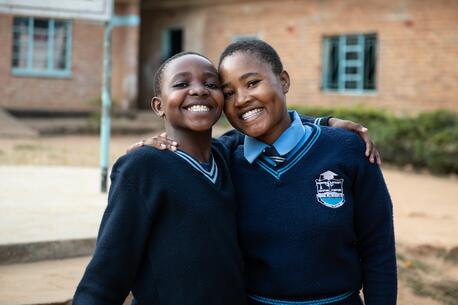
Broadening Girls' Horizons in Zambia
A UNICEF-supported program in Zambia is helping girls develop STEM skills and entrepreneurship so they can take charge of their futures.
Around the world, women and girls have always faced more than their fair share of challenges. When water for drinking, cooking and washing is an eight-hour walk away, it's a woman or girl who takes the lonely, often unsafe, journey. When a family doesn't have enough money to send every child to school, it's the son's fees over the daughter's that get paid. In some countries where access to health care and nutrition is limited, girls get treated second, after boys, or not at all.
On International Women’s Day, we’re celebrating women and girls who advocate for themselves, refuse to settle for less and even in the face of adversity stand up for their rights.
From Zambia comes this story of girls who are thinking ambitiously about their futures thanks to a UNICEF-supported program called Girls 2030. Started in 2016 and funded by the London Stock Exchange Foundation, Girls 2030 offers teens, especially girls from areas where few go to high school, career guidance at after-school clubs and summer camps, mentoring and internships with companies, including telecommunications and water utilities.
In Zambia, girls drop out at nearly twice the rate of boys, often for lack of financial or parental support. By helping them develop science, technology, engineering and mathematics (STEM) skills and learn about entrepreneurship, Girls 2030 inspires many who are in danger of getting married or pregnant before their time to think big about their futures by putting their educations first.
Below, John James, UNICEF Zambia Chief of Communications, reports from an evening debrief attended by participants in Girls 2030 internships in Lusaka, Zambia. Catching them midway through their stints working in a range of fields, he offers a glimpse of the power and promise of girls who are energized to learn:
Lusaka, Zambia
As I climbed the stairs to the main meeting room, I could already sense the buzz and excitement. The floor shook as around a hundred girls in their mid-teens performed dances, stamped their feet and sang choruses. The shout went up: “You can make a difference. We can make a difference.” All the girls wore Girls 2030 T-shirts. Everyone I spoke with described being in the middle of a transformative two-week experience.
Girls 2030 gives girls from schools across the country training in life skills and financial literacy as well as a broader vision for their careers. Those gathered tonight are wide-eyed at the new experiences they've had during their internships. As one after another takes the microphone, they talk about their days and the motivational advice they've gleaned from the professional mentors each student has been assigned.
One girl recounts discovering a computer for the first time, describing the different pieces of hardware that make a computer work. Others share advice on how to feel confident, learn from failure and "be careful with boyfriends." When someone mentions the slogan "School first. Marriage later," a big cheer goes up, an encouraging sign given Zambia's high rate of child marriage, which almost always puts an end to a girl’s education and curtails her future prospects.

More than 200 school clubs are up and running, complemented by an annual motivational camp, and two rounds of internship programs in the spring and summer.
Here, three of the Girls 2030 participants talk about their experiences:
Joyce Muzhiwo, 16
I had wanted to be a doctor, but now I want to be an accountant. I’m passionate about that. No one can get in my way.
“I’ve never been in a big group like this. It has been really good to interact with girls from different districts. It’s really gorgeous to see big buildings – it has really motivated me. I’ve experienced being in a big office for the first time – maybe before I’d just been in the headmaster’s office. But now I’ve been in places where my father has never been. Where even women are managers. We saw swimming pools for the first time – I’d just swum in rivers before.
“I want to make my mum proud. I had wanted to be a doctor, but now I want to be an accountant. I’m passionate about that. I really love balancing books at the end of the year. I’ll go back home and teach others about what I’ve learned. I’ll tell others that for us to reach our goals, we’ll really have to study hard, and no one can get in my way.”

Girls taking part in the Girls 2030 internships in Lusaka, Zambia, meet for an evening debrief session.
Chileleko Habukale, 14
The main thing that I’ve learned is that I shouldn’t give up. I shouldn’t let anything be a barrier to my education.
“I came as a future doctor, but I’m now going back as a future water engineer. The things I was told by my mentors, the experiences I’ve gone through, the things I’ve seen with my own eyes — they have changed my thinking. I never thought of a lady as an engineer — I thought engineering was just for men. Here I’ve met people with careers that I thought were just for men and I was inspired. It’s really shocking that in construction, there are only a few ladies, so I want to be among those few who inspire other women."
“The main thing that I’ve learned from my mentor is that I shouldn’t give up. I shouldn’t let anything be a barrier to my education — be it financial problems or other things. She told me we shouldn’t be saying, ‘This is for men.’ I can do what a man can do.”
“We have a water problem at home. Since I changed my career plan to be a water engineer, I want to put water where I know that there’s no water. I want to impress my family by showing what I’ve learned here.”
Bridget Linda, 16
This opportunity has really changed my life. I’ve learned that I really need to work hard and study hard to achieve something.
“My mentor told us that you don't always you get whatever you want. And that you should choose a career not just from what a person gets paid when they first start working. Instead my mentor told us to look at which subjects you are good in and not to just go for a career because you've seen a person [do it].
“I thank UNICEF and everyone involved for looking after us and giving us this opportunity to come here because it has really changed my life. With this, I’ve learned that I really need to work hard and study hard in order to achieve something. I’m coming from a family where my parents are teachers and my elder siblings are also teachers, but for me, I want to make a difference in my family and do something [beyond] what everyone is expecting.”
Learn more about UNICEF’s work protecting children against violence and promoting the rights of women and girls.
Top Photo: Participants in Girls 2030, a project supported by the London Stock Exchange Foundation. Photos courtesy of UNICEF Zambia.
HOW TO HELP
There are many ways to make a difference
War, famine, poverty, natural disasters — threats to the world's children keep coming. But UNICEF won't stop working to keep children healthy and safe.
UNICEF works in over 190 countries and territories — more places than any other children's organization. UNICEF has the world's largest humanitarian warehouse and, when disaster strikes, can get supplies almost anywhere within 72 hours. Constantly innovating, always advocating for a better world for children, UNICEF works to ensure that every child can grow up healthy, educated, protected and respected.
Would you like to help give all children the opportunity to reach their full potential? There are many ways to get involved.





